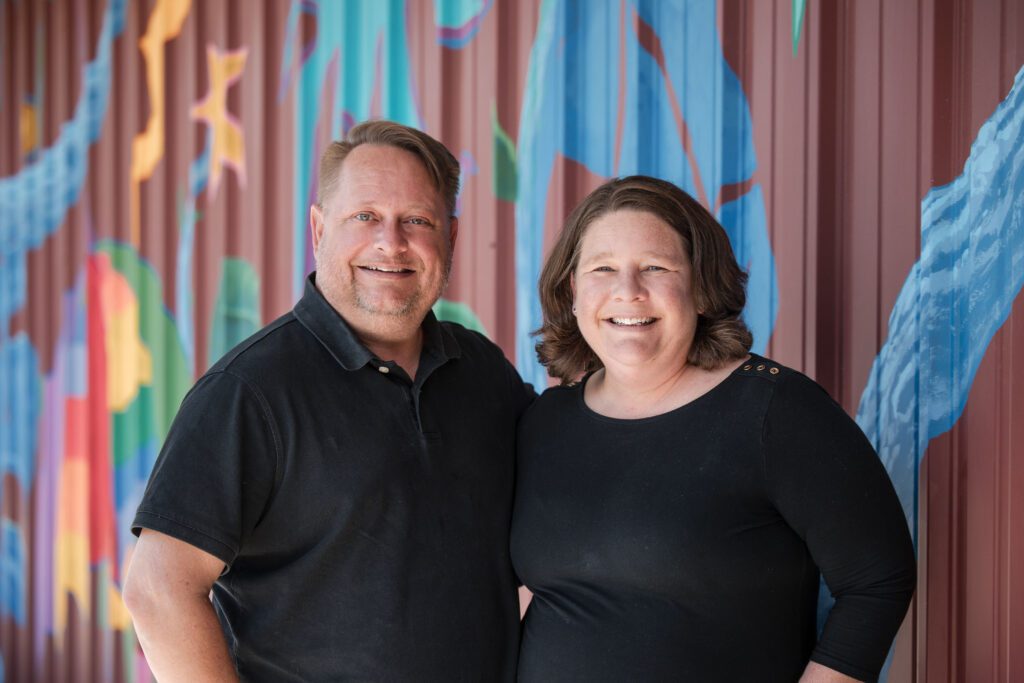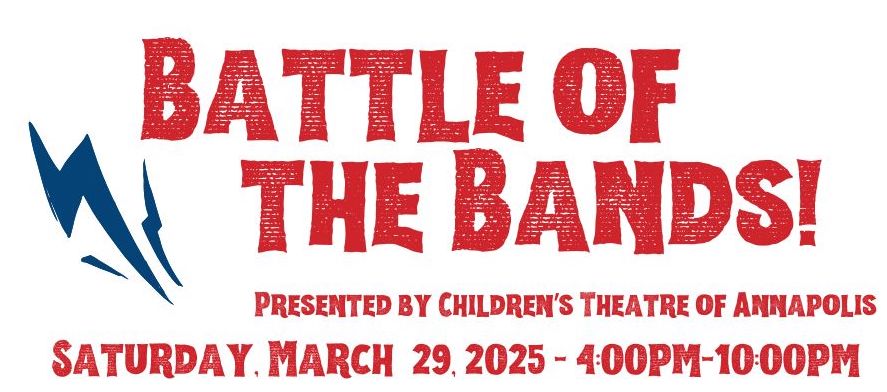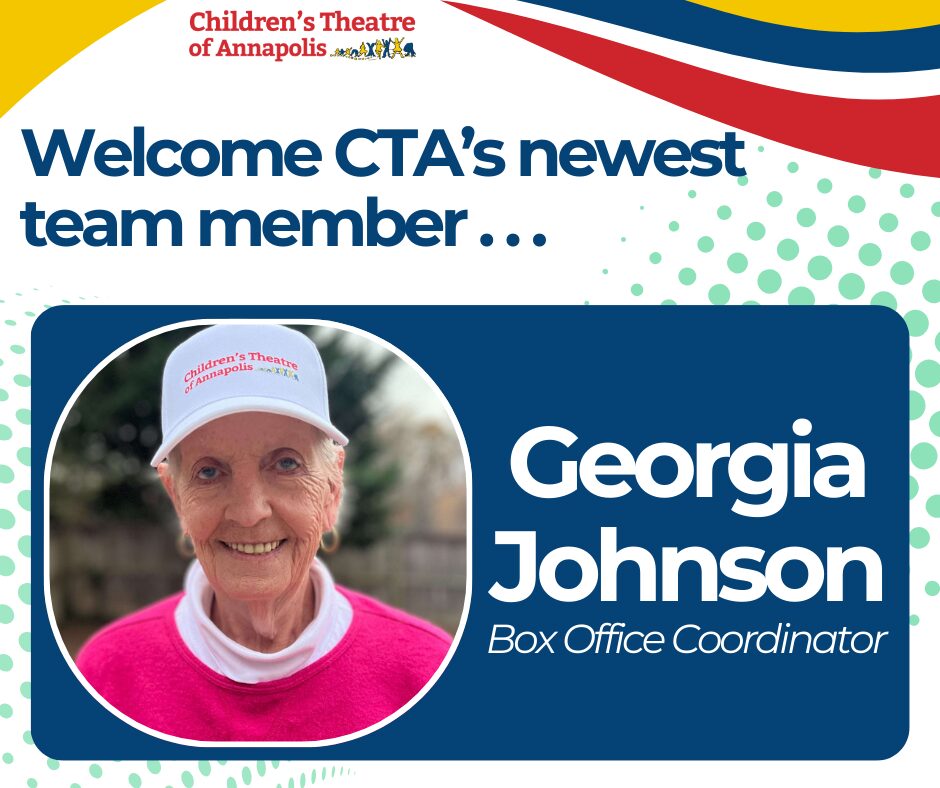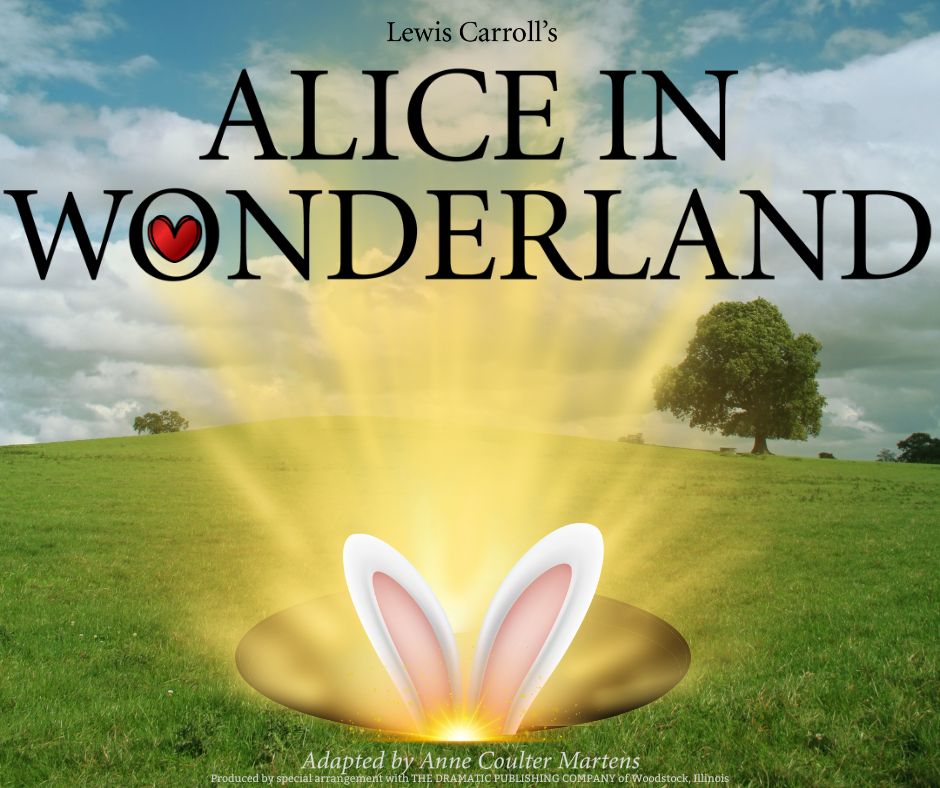Effective June 1, 2025, it is with great excitement and pride that Children’s Theatre of Annapolis (CTA) welcomes two outstanding professionals to its leadership team. Amy Schropp is the Executive Director of Development and Engagement with primary focuses on grants, donors, and community partnerships and Jason Kimmell is the Executive Director of Management and Education with primary focuses on business operations, personnel management, and education. These new Executive Directors are expected to bring a fresh perspective and boost the company’s continuous growth.
Amy started with CTA as a volunteer in 2022 and joined the Board of Directors in 2023. With a strong community service background, she’s produced shows, built up and run our volunteer base, and helped strategically lead CTA. Amy has a Ph.D. in clinical psychology. She has proven to be an intrinsic force for community involvement in the organization. With a passion for community partnerships and providing opportunities for youth in the performing arts, Amy brings a fresh and positive perspective to this position.
Jason has worked in community + regional production companies, dinner theatre, television, and Broadway. From 2006-2022 he served as artistic staff for a myriad of our main stage productions and began working as a staff member in 2013. Over the years, Jason has a proven track record of success in CTA as an integral business and arts component. With 40 years in the performing arts + 21 years in youth education, he brings a wealth of experience along with a strong passion for nurturing the growth and development of the love of theater in children.
“Both leaders bring not only exceptional skills but also a heartfelt commitment to the role theatre plays in a child’s development. I am confident that their contributions will elevate our work and deepen our impact.”, says Michelle Bruno – President of the Board of Directors for Children’s Theatre of Annapolis. “We look forward to all we will create together on—and beyond—the stage.”
Photo Credit: Wendy Hickok Photography
The end of the 2024/2025 season is upon us, here at the Children’s Theatre of Annapolis! As we close out our Season of Discovering Wonder, we are so excited to open the third and final installment, Disney’s Finding Nemo JR. The show opens on Friday, May 16th, running through June 1st. This is gearing up to be a not to be missed show! Get your tickets now at https://cta.ticketleap.com/disneys-finding-nemo-jr/
CTA is finishing a fantastic year, but the Arts face many challenges. This is a hard time to be in the performing arts non-profit arena.
In difficult times, the arts have always been a source of light—and right now, that light needs your help to keep shining.
At CTA we create more than just performances. We create safe spaces for children to express themselves, build confidence, and find their voice. But like so many arts organizations, we’re facing unprecedented challenges: funding cuts, rising costs, and fewer opportunities for creative programming in schools.
As support for the arts declines nationwide, small community theatres like ours are being hit the hardest.
In a world that’s growing louder and more chaotic, children need a stage to dream, to speak, and to be heard. With your support, we can keep the curtain rising.
CTA relies on your support to keep the joy and talent you see on stage going. Please see various ways you can support.
- Volunteer! We love and rely on our volunteers to put on our fantastic shows, but also to support the work we do, like education and community outreach
- Construction slated to start on our annex had to be delayed. While it is delayed, you can still support this future project! This will allow CTA to expand its reach and become a leading arts center. Please help support via our capital campaign.
- General Donations can be given using this link; Donate
We love our surrounding and local community! We have over 6,000 people come through our doors annually. With the annex buildout, this number will only increase! Sponsorship with CTA is a great idea for any local business or business that is child-focused. For sponsorship opportunities, email amyschropp@childrenstheatreofannapolis.org.
Stay up to date with everything CTA by following these links:
Upcoming 2025-2026 Season
- West Side Story ….. October 24th-November 9th, 2025
- Holes ….. February 13th -March 1st 2026
- Disney’s Lion King, JR ….. May 8th -May 24th 2026
From our Family to yours,
Michelle Bruno
President; Children’s Theatre of Annapolis
www.childrenstheatreofannapolis.org
| Nemo |
Hannah Koloski |
| Marlin |
John Lyons |
| Dory |
Sarabelle Stephens |
| Prof Ray |
Asher Schropp |
| Reef Parent/Nigel |
Anna Hetherington |
| Reef Parent’ |
Elsa Madsen |
| Pearl |
Adeline McQuarrie |
| Sheldon |
Yara Brown |
| Tad |
Braxton Stork |
| Bruce |
Carter Rollison |
| Chum |
Abigail Bowders |
| Anchor/Reef Parent/Vacationer |
Lina Friends |
| Bubbles |
Theia John |
| Bloat |
Avonlea Millero |
| Gurgle |
Ava Windsor |
| Peach |
Beatrice Kissinger |
| Gill |
Addie Corn |
| Crush |
Olutomide Famuyiwa |
| Squirt |
Ademide Famuyiwa |
| Kai |
Scarlett Hlavek |
| Breeze |
Zoë Sommers |
| Coral/Scuba mask dancer |
Aramide Famuyiwa |
| Reef Kid/Featured Fish Ensemble |
Sammy Schropp |
| Reef Kid/Featured Fish Ensemble |
Ben Schropp |
As we get ready to ROCK for our first-annual Battle of the Bands Competition, we invite you to sponsor this incredible event. Your sponsorship helps ensure that Children’s Theatre of Annapolis (CTA) is positioned to provide all children with exposure and engagement in all aspects of the theatrical experience. This event will draw over 200 enthusiastic and diverse audience members from across Anne Arundel and adjacent counties.
Event sponsors will receive many benefits, including visibility and exposure. We offer various sponsorship packages, outlined below, that ensure your company is prominently displayed at the event, in promotional materials, and across our digital platforms. Sponsoring this event isn’t just about financial support – it’s about demonstrating your commitment to children and the arts. CTA reaches more than 8,000 youth and families annually through performances, workshops and classes, so your sponsorship will be highlighted in front of thousands of families.
Executive Producer – $5,000 – Limited to one sponsor. Recognized as the headlining sponsor of the event. Opportunity to speak/present during the Battle from stage. VIP seating and general admission tickets for four. Prominent logo placement included on all advertising, event signage, and associated digital recognition and social media. Live mentions during the event by the MC.
Lead Producer – $2,000 – Premium recognition, including logo, on all advertising, event signage, and associated digital recognition and social media. Large logo placement on all written and digital materials, including banners at the event. VIP seating and general admission tickets for two guests. Live mentions during the event by the MC.
Band Manager – $1,000 – Logo and link on our website and social media posts. Listed boldly on all signage and printed materials.
Number 1 Fan – $500 – Logo and link on our website and social media posts. Listed on our signage and printed materials.
Groupie – $250 – Logo and link on our website and social media posts.
CTA is a 501(c)3 nonprofit, tax-ID: 23-7003491. Your sponsorship may be tax deductible to the extent allowed by the law. Check with your tax advisor. Please keep a copy of this form for your tax records. Confirmation of receipt will be mailed after the event.
Please fill out the form attached to this link for your sponsorship and contact April Forrer, Executive Director, at ctabattleofthebands@childrenstheatreofannapolis.org or 410-757-2281 with any questions.
Children’s Theatre of Annapolis – 1661 Bay Head Road, Annapolis, MD 21409 – 410-757-2281
Get Ready to Rock!
We want your band for an epic night of music, competition, and unforgettable performances at the Battle of the Bands at Children’s Theatre of Annapolis!
Event Details
Date: March 29, 2025
Time: 4:00pm – 8:00pm Battle of the Bands,
8:00pm – 10:00pm – After party and awards
Location: Children’s Theatre of Annapolis, 1661 Bay Head Road, Annapolis, MD 21409
Prize Winnings:
Deadline to register is Feb 21, 2025
Children’s Theatre of Annapolis wants local bands to battle it out for the title of Ultimate Band Champion. There will be a theatre full of people wanting to cheer you on and vote for their favorite band!
Why You Should Be A Part of this fantastic event:
Show off your talent on stage! Share your music! Have Fun! Engage the local community!
CTA is excited to bring local bands to the stage in this new event to let our locals shine. We expect at least 200 people to come to the Battle of the Bands!
How to Enter
- Send a video of your band’s past performance to CTAbattleofthebands@childrenstheatreofannapolis.org. This video is necessary to enter the competition. Videos may also be used to publicize the event and promotional material.
- Within the email submission, please state the name of your band and number of band members. Click here to fill out the band entry form. Feel free to include any information you feel will make your case to be included in this debut event!!
Contest Rules
- It is free to apply, but if chosen, there will be a $75 Registration fee. This fee will help to support operational and administrative fees for the contest.
- All band members must be 13 years old or older.
- Minimum of 1 member in each band, but the one band member must play an instrument live on stage.
- No foul language, or crude/offensive/vulgar behavior of any kind is allowed on stage, in lyrics, off stage, or otherwise. Absolutely no moshing (audience included).
- Band members are only allowed on stage during their set. Bands or members who go on stage while another band is competing, will be disqualified from the competition.
- Winning bands will be determined by a panel of judges based on musical talent as determined by our panel of judges, crowd enthusiasm, showmanship of band members, ability to follow contest rules and originality of song.
- Ticket sales are not a factor in the judging of the winning bands.
- Each band will have a 15 minutes set limit for the first round.
- The two bands voted as finalists will have another 12 minute set before the winner is announced.
- Once selected, further contest details and logistics will be shared.
Are you ready to rock?
For more information, contact us at CTAbattleofthebands@childrenstheatreofannapolis.org or visit our website at www.childrenstheatreofannapolis.org.
Disney’s Finding Nemo JR. is a musical adaptation of the beloved 2003 Pixar movie Finding Nemo, with new music by award-winning songwriting team Kristen Anderson-Lopez and Robert Lopez. Marlin, an anxious and over-protective clownfish, lives in the Great Barrier Reef with his kid Nemo, who longs to explore the world beyond their anemone home.
Audition Dates: Sat, Jan 18th 10 a.m.-1 p.m., Sun, Jan 19 10 a.m.-1 p.m. & Mon, Jan 20th 6-9 p.m.
In order to audition, your student must be between the ages of 8-14 at the time of the audition. All roles are open. CTA encourages all performers to audition no matter their background, race, ethnicity, gender, gender identity, expression, body type, or abilities. No experience is required. The artistic staff will cast all performers based upon their talents displayed during the audition process + suitability for the parts.
Please sign up for your audition times at .
To complete your audition registration, please fill out the required information. This must be filled out BEFORE you come to your audition. If you have any questions, please contact us at executiveproducer@childrenstheatreofannapolis.org. We look forward to seeing you at auditions!
Sign up for your audition slot here
Click Audition Scene Preliminary to download the AUDITION SIDE – Dory, Marlin
Click here to watch the Nemo Audition Choreography .MOV
Click here for the audition form
Click here for the character breakdown
We conducted a Quick 5 “Getting to Know You” interview with CTA’s newest team member, Georgia Johnson, to introduce her to our community! As the new Box Office Coordinator, Georgia will be overseeing the Box Office’s communications, customer service, and online / in-person ticket sales.
CTA: What motivated you to join CTA’s team?
GEORGIA: My daughter and grandson are active in CTA and it’s a great way for me to connect with and serve the community.
CTA: What is a hobby or interest that you enjoy outside of work?
GEORGIA: Family time and cooking.
CTA: What is your favorite play or musical?
GEORGIA: Les Miserables.
CTA: Name four people you would invite to your dream dinner party.
GEORGIA: John Denver, Dan Fogelberg, James Taylor, Graham Nash.
CTA: What is your biggest goal for this year?
GEORGIA: One of my goals is to become more involved in my grandchildren’s lives, now that I am back to living in MD.
FUN FACTS!
- I am an avid scuba diver with over 1,500 dives.
- In 2007 I rode my Harley to Miami and onto a cruise ship, riding on all of the islands where we docked.
As the holiday season draws near, we at CTA find ourselves reflecting on the many moments that made this year extraordinary. It is because of your unwavering support, enthusiasm, and love for the arts that our theatre has been able to bring stories to life, inspire creativity, and foster a sense of community.
Please keep in mind that Giving Tuesday is on December 3, 2024. Giving Tuesday is a global movement dedicated to giving back and strengthening communities. It’s a day to rally together, inspire generosity, and spark positive change – and we’re thrilled to invite you to be a part of it. To visit our Giving Tuesday donation page, click here.
As we prepare for the year ahead, we’re thrilled to share a glimpse of what’s to come: a new season filled with captivating productions, “Alice In Wonderland” February 7-23, 2025 and Disney-Pixar’s “Finding Nemo JR.”, May 16-June 1, 2025; and meaningful programs, “Circus Pop! The Giant Bubble Show”, November 22nd and “DFC’s Holiday Cabaret”, December 7th, where Santa will again visit CTA. To visit our events page, click here.
We are also looking forward to breaking ground on our new annex build out, where CTA will expand to include more communities and more Art genres. To read more about Growing Our Reach, click here.
None of this would be possible without you, and we are deeply grateful for your continued partnership.
From all of us at CTA, we wish you and your loved ones a holiday season filled with warmth, joy, and cherished memories. May the magic of this time inspire and uplift you as we step into a new year together.
Thank you for being part of our story. We can’t wait to share more moments of artistry and connection with you in 2025!
With heartfelt gratitude,
April Forrer
Executive Director
Children’s Theatre of Annapolis
| Alice |
Zoe |
Sommers |
| Cheshire Cat |
Peter |
Cardillo |
| White Rabbit |
Elliot |
Johnson |
| Caterpillar/Flower Rose/Courtier |
Sydney |
Switzer |
| March Hare/Gardener-Two of ♠️ |
Elena |
Hill |
| Frog Footman/Solider/Child #2 |
Heaven |
Bolling |
| Duchess |
Amari |
Cromwell |
| Cook/Flower Pink/Child #1 |
Mollie |
Ebinger |
| Humpty Dumpty/First Lady/Mock Turtle |
Clara |
Schurke |
| Gardener- Seven of ♠️/Gryphon |
Arden |
Wyrick |
| Soliders-Two of ♦️ |
Jeanie |
Defosse |
| Mad Hatter |
Emily |
Eugene |
| Dormouse/Child #3 |
Emily |
Steven |
| Queen of Hearts |
Liv |
Hurd |
| King of Hearts |
Brenna |
McGuire |
| First Lady(1 of 2)/Flower Yellow |
Alaya |
Bell |
| Executioner- Ten of ♣️ |
Braxton |
Stork |
| TweedleDee/Flower Violet |
Arthur |
Coelho |
| TweedleDum/Flower Blue |
Scarlett |
Hlavek |
| Gardener- Five of ♠️ |
Castin |
Dillon-Williams |
| Knave/Flower White |
John |
Lyons |
Thank You to the 41 volunteers that helped to make CTA’s Fall Festival an enormous success. Your efforts helped us raise nearly $3,000, which will go towards funding our Senior events and scholarships. On behalf of those seniors, I’d like to thank you for all of your support!
From auditions through closing night, 83 volunteers put in over 2,231.75 hours of service in support of Tuck Everlasting at CTA! Your generosity with your time and talent was an essential component in creating a beautiful production & guest experience. We are so grateful for your service, and could not put on the professional quality shows that we do without you. Thank You!
I say over 2,231.75 hours because this total counts only the hours scheduled, not the hours spent outside the theatre sewing costumes, thrift shopping for props, or putting in some unscheduled time fixing something that broke at a rehearsal. Our CTA Volunteers are unparalleled in their professionalism, kindness, and commitment. You are all PHENOMENAL!
Did you miss the chance to help with our Fall Festival and Tuck Everlasting? Need to earn some service hours for school or want to enjoy some behind the scenes time with your family creating magic? Fear not, we are already working on our next production, Alice in Wonderland, and have openings to help support fundraising and community events.
CURRENT VOLUNTEER OPENINGS:
- Circus Pop! performance on November 22nd. This is an excellent opportunity for students to earn service hours by taking tickets, selling concessions, or serving as ushers at the event.
o 5:30 pm – 9:30 pm – Concessions & Merchandise Sales
o 5:30 pm – 7:30 pm – Ticket Takers
o 8:00 pm – 9:30 pm – Clean Up Crew
- Set Building and Set Decoration for Alice in Wonderland. The following dates have been added to the schedule (see below). You do not need any special skills or exceptional artistic talent to join the crew. You need only be willing to work collaboratively with others to help create the whimsical, whacky world that is Wonderland.
o Set Build Days:
- Sunday, November 24th 9am-Noon
- Monday, November 25th 5:30pm-8:30pm
- Sunday, December 1st 9am-Noon
- Sunday, January 5th 9am-Noon
o Set Decoration Days:
- Monday, December 2nd 5:30pm-8:30pm
- Monday, January 6th 5:30pm-8:30pm
- Sunday, January 12th 9am-Noon
DFC’s Holiday Cabaret on December 7th. Another opportunity for students that need service hours. We are looking for Front of House volunteers and Tech Crew (light board, sound board, sound runner) assistance for this event.
o 10:00 am – 1:00 pm – Set Up Crew
o Noon – 6:00 pm – Tech Crew (light board operator, sound board operator)
o 1:00 pm – 3:00 pm – Ticket Takers
o 5:00 pm – 6:00 pm – Clean Up Crew
Interested in volunteering with any of these events? Here’s how you can get involved.
All volunteer scheduling is done through Volunteer Scheduler Pro. Unless you are already registered through the VSP system, you will need to register and login to sign up to help. You can find the volunteer registration form using THIS LINK. Please Note: You will only see volunteer slots available for the jobs and shifts that you select when filling out the registration form. Please choose ALL areas in which you have some interest, and when completing the Shift Preferences section, do not click the button to be scheduled only at these shifts. Choosing that option will result in you being unable to see and sign up for many of our volunteer opportunities. You will not be scheduled by CTA without being contacted for approval. We do not use the automatic scheduling feature of this software. You are in control of your schedule!
Adults (everyone aged 18 years and over) are required to have an up-to-date background screening through Anne Arundel County Department of Recreation and Parks. You can determine if you have this screening by looking for your name on this list. If your name is not on the list, you will be required to complete that screening BEFORE volunteering at CTA. The background screening form is available at this link.
COMING SOON:
Be a part of the wonder this season by joining the Alice Crew (costumes, props, stagehands, lighting, & sound) or volunteering in the front of house (ticket taking, ushering, concessions sales). Front of House volunteers are able to watch the show for FREE in reserved seats in the back of the house.
If you would like to be a part of CTA’s production of Alice in Wonderland, please register as a volunteer (if you have not done so already this year), and sign up to help using THIS LINK. If you have any questions about volunteering at CTA, please contact our volunteer coordinator, Amy Schropp, at volunteers@childrenstheatreofannapolis.org.
YOU ARE WELCOME HERE!
Thank you for considering becoming part of the CTA family!








